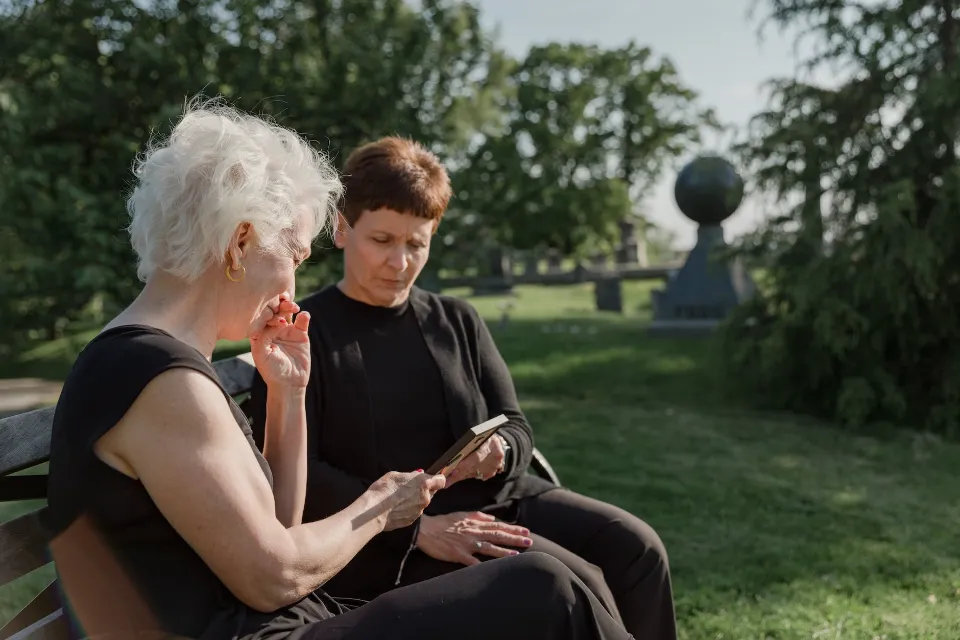Anyone new to the dementia of a loved one often wonders, “How do you communicate with someone who has short-term memory loss?”
Simple: converse with the dementia patient as you would with a young child. It does entail speaking in plainer language while maintaining a supportive demeanor, cheery expressions, direct eye contact, and welcoming gestures. Being patient is necessary.
We cover information about short-term memory loss and provide tips for communicating with people who show signs of memory loss.
What is Short Term Memory Loss?
Forgetting recently stored information is short-term memory loss. Living alone without assistance can be challenging if it gets bad enough.
Symptoms of short term memory loss include the following:
- Repeatedly asking the same questions
- Forgetting where you put things
- No memory of recent events
- Forgetting what you saw and read recently
Causes of Short Term Memory Loss
At some point in our lives, many of us struggle with our short-term memory, and aging is often accompanied by a mild decline in other cognitive abilities. Short-term memory loss is something that should not be taken lightly and should be investigated further. Some memory issues are the result of treatable conditions, and when the condition is properly managed, memory loss is frequently reversible. Possible causes of reversible memory loss can include:
- Minor head injury/trauma such as concussion
- Side effects of some medications
- A vitamin or thyroid deficiency
- Emotional disorders such as stress, anxiety, or depression
- A brain disease such as an infection or tumor
- Functional cognitive disorder (FCD)
- Alcoholism
- Sleep problems such as sleep apnea and sleep deprivation
- Smoking
- Post-traumatic stress disorder (PTSD)

How to Talk to Someone With Short Term Memory Loss?
Create a Quiet Environment
Reduce the background noise as much as possible. If your kids are running around and making noise, ask them to go play in another room and to keep it down. Switch off the radio and TV.
If your loved one is living in a personal care or memory care home, shut the door during your visit to reduce noises from the hallway. Then, employ easy strategies to capture and maintain your loved one’s attention.
Make a name-to-name call to your relative. Don’t become upset if he or she doesn’t remember your name; just identify yourself and move on. Keep your gaze fixed on the other person. Then, lightly touch the hand, forearm, or shoulder to direct attention.
Smile and Smooth
A loved one should always be reassured. Hold his or her hand after making eye contact and grinning. Speak in a soothing, gentle tone. Let your relative know that he or she is in a safe, non-judgmental environment.
Use a Positive Tone
Even though it’s upsetting to see your loved one’s cognitive decline, you should try to maintain an upbeat demeanor when you’re speaking with him or her. Alzheimer’s patients may not be able to understand everything you say or ask, but they can certainly tell when you’re feeling down or happy.
If you seem worried, anxious or upset, they’ll become anxious or upset, too.
So, speak in a positive, uplifting tone. Smiling and being upbeat with them are both appropriate. Use gentle words and gestures.
Use Nouns
Whenever possible, use names and nouns. For example, if you and your husband visit your mother at her memory care home, and you return to the room after stepping out for a moment to talk to the nurse, and find your husband has also left the room, don’t ask, “Where did he go?” Instead ask, “Why did Bob leave, Mom?”
Or, if your mother is telling you a story about a past event — say, a time that your father went to New York — don’t ask, “He attended a game while he was there, right?” ask “Did your father visit Yankee Stadium while he was in New York?”
Keep Calm
For their loved ones to successfully transition to a new memory care facility, caregivers must be actively involved. You’ll need to be at ease because they’ll be looking to you for support and as a calming influence.
Having a well-defined transition plan in place can help keep you organized and focused on your older relative’s most critical need: the need to feel safe, secure and cared for in new surroundings.

Adhere to Short Sentences
You don’t have to shout or speak in an overly simplistic way. However, to convey meaning, speak slowly, clearly, and in an even tone. Preferably, use one- and two-syllable words.
You can direct your loved one’s attention by speaking with a lower pitch than usual.
If your loved one asks you to say something more than once, don’t view it as a setback or defeat. Just do so and, if they still don’t understand you, move on to the next topic. Later, you might rephrase the question or sentence.
Be Patient
It might be alluring to speak for your loved one when they are having trouble finding the right words. You can do that occasionally, but try not to do it too frequently. Your loved one might become dependent on you to tell their story for them and become discouraged from trying to communicate.
Brain training, however, is also a part of memory care. It’s fine if they have trouble coming up with a word. Just keep eye contact and maintain an encouraging expression and tone. Becoming at ease in silence requires practice.
Distract and Redirect
When your loved one forgets something, he or she might occasionally become upset, especially if it’s late in the day and they are worn out.
In that case, gently divert their attention or redirect the conversation. Invite them to follow you down the hallway as you stand up, stretch, and stand. On a different subject, pose a different, more straightforward question. Lean over and give a hug. Just show that you appreciate being in their presence, regardless of their ability to remember.
Summary
One way you can help a friend or family member with memory loss is by communicating effectively. Remember that conversing with someone who has short-term memory loss is very dissimilar from other types of communication. It’s possible that you believe you are direct and lucid. However, the disorder affects the way your family member or friend processes information. Using the eight tips above can be effective in helping you communicate with a loved one with brief memory loss.



